Peržvelgėme Evangelijose pateiktus Jėzaus portretus, žvelgdami į jį per žydišką prizmę. Taip pastebėjome dvi svarbiausias temas.
- Žydai prisidėjo prie žmonijos gerovės daugelyje veiklos sričių. Tačiau jų istorija kupina didžiulių kančių ir liūdesio.
- Jėzus dalyvavo, netgi vadovavo visai šiai žydų patirčiai. Tai matome daugybėje paralelių. Apžvelgiame ir panagrinėjame dar keletą, įskaitant šiuolaikinį hebrajų kalbos atgimimą ir Mozės nustatytas šventes.
Žydų indėlis į žmonijos pažangą
Apsvarstykite toliau pateiktus faktus, atsižvelgiant į tai, kad bendra žydų populiacija yra 15,2 mln., t. y. 0,19 % iš 8 milijardų pasaulio gyventojų .
- Nuo 1901 iki 2021 m. žydai sudarė 22 % visų pasaulyje Nobelio premijų gavėjų (suvestyje visos Nobelio premijų serijos chemijos, literatūros, fizikos, ekonomikos, medicinos ir taikos premijos).
- Žydams skirta 38% JAV Nacionalinio mokslų medalio .
- Japonijos geidžiama Kioto premija (tiek už meno, tiek mokslo pasiekimus) 24 % atvejų buvo skirta žydams .
- Prancūzijos mokslų akademijos Grande Médaille ordinas žydams buvo įteiktas 48% atvejų .
- Iš Mokslinės Britų karališkosios draugijos narių ( wiki santrauka ) 26 % yra žydai nuo 1901 m .
Apklausėme žydus, kurie padarė didelę įtaką šiuolaikinei visuomenei:
- Karlas Marksas ,
- Albertas Einšteinas ,
- Zigmundas Freudas ,
- Markas Zuckerbergas iš „Facebook“ ,
- Sergijus Brinas ir Laris Peidžas iš „Google“ ,
- Rotšildai ir George’as Sorosas ,
- Stan Lee iš „Marvel Comics“ ,
- Ukrainos prezidentas Zelenskis ,
- Billas Maharas, Sethas Rogenas, Sasha Baronas Cohenas
- Isaacas Asimovas, Williamas Shatneris ir Leonardas Nimoy .
Sužinojome, kaip žydai vadovavo kuriant pirmąją abėcėlę . Jie ir toliau skleidžia inovacijas daugelyje sričių. Jie palaimino pasaulį būdami šviesa tautoms .
Žydų liūdesys
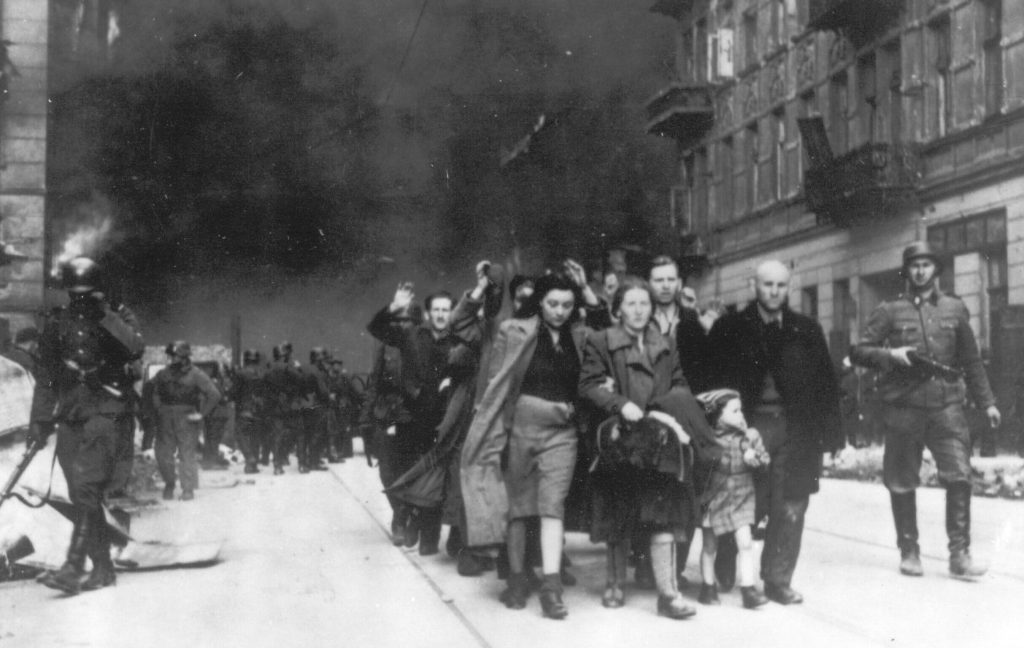
Tačiau žydams nelengva buvo įveikti sėkmę. Tai iliustruoja Anos Frank , Simono bar Kochbos , makabiejų , Richardo Wurmbrando, Natano Sharansky istorijos ir pakartotiniai žydų tremimai visoje Europoje , kurių kulminacija buvo Holokaustas . Žmonija per visą istoriją susidūrė su daugybe rasizmo problemų . Tačiau žydai yra vienintelė tauta, kuriai reikėjo sukurti terminą, apibūdinantį neslopinamą neapykantą ir persekiojimą, nukreiptą būtent prieš juos ( antisemitizmas ). Kartu su jų polinkiu į naujoves, atrodo, kad jie nuolat susiduria su priešiškumo principu.
Iš tiesų, žydų sėkmė dažnai sukelia kitiems baimę, kad jie kontroliuoja visuomenę , puoselėdami piktavališkus ketinimus perimti valdžią. Šios baimės, nors ir nepagrįstos, atrodo, plinta daugelyje socialinių sektorių. Daug kartų jos buvo antisemitinių protrūkių priežastimi.
Kitais atvejais tam tikrų žydų sėkmė sukėlė klausimų, dėl kurių kilo nepasitenkinimas žydais apskritai. Pavyzdys – su Rusijos prezidentu Putinu susiję Rusijos oligarchai. Iš 210 Rusijos oligarchų, kurių vertė viršija 1 milijardą dolerių, 20, arba 10 proc., yra žydai . Tai gerokai daugiau nei Rusijos žydų skaičius vienam gyventojui – 0,16 proc. Rusijos gyventojų . Tarp šių Rusijos žydų oligarchų žymiausi yra Romanas Abramovičius, Piotras Avenas, Borisas Berezovskis, Michailas Fridmanas, Vladimiras Gusinskis, Michailas Chodorkovskis ir Aleksandras Smolenskis. Šeši iš septynių didžiausių Rusijos oligarchų yra žydai. Šis svoris pradėjo sudaryti įspūdį, kad visi oligarchai yra žydai . Ir vėlgi, žydų talentas padarė neproporcingai didelę įtaką. Taigi, atidžiai stebint oligarchus, kai kurie baiminasi artėjančios antisemitinės reakcijos.
Žydų likimą formuojanti galia
Taigi, kaip paaiškinti žydų gebėjimus ir jų sielvarto istoriją? Čia nagrinėjome priešiškumo dvasią, nukreiptą prieš juos . Biblijoje jų bendra situacija pateikiama kaip dar sudėtingesnė.
Prieš 4000 metų, Abraomo šauksmu , Tas, kuris jį šaukė, pareiškė:
‘Aš padarysiu tave didele tauta, tave laiminsiu ir padarysiu tavo vardą garsų; ir tu būsi palaiminimas. Aš laiminsiu tuos, kurie tave laimina, ir prakeiksiu tuos, kurie tave keikia, ir tavyje bus palaimintos visos žemės giminės.“ ‘
Pradžios knyga 12:2-3
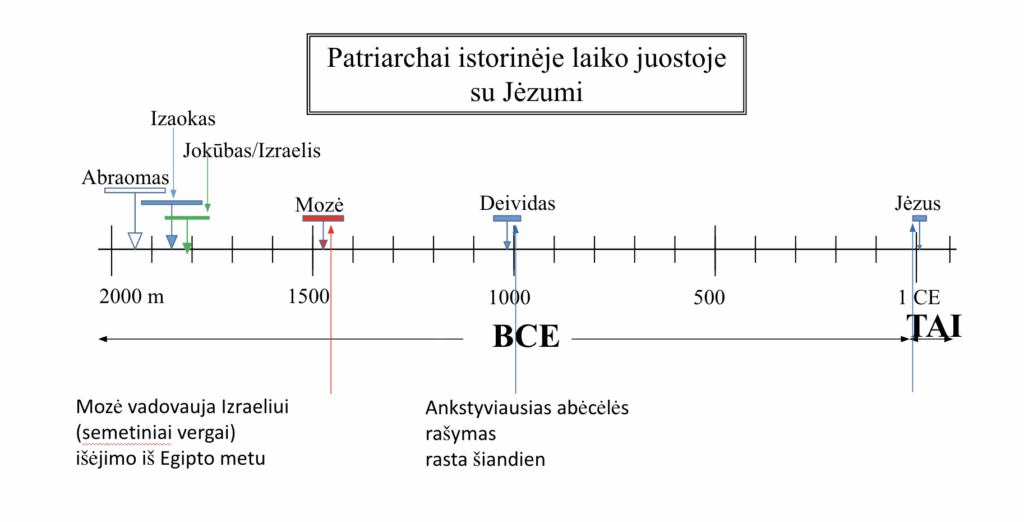
Tada, po penkių šimtų metų (1500 m. pr. Kr.), tas pats Esatis per Mozę paskelbė Palaiminimus ir Prakeiksmus . Mozė numatė, kad tai formuos pasaulio istoriją ateityje, ir taip atsitiko.

Vėliau (750 m. pr. Kr.), Izaijas, taip pat tos pačios Jėgos vardu, ne kartą pranašavo:
‘„Aš, Viešpats, pašaukiau tave teisumu. Aš laikysiu tave už rankos ir padarysiu tave sandora tautai, šviesa pagonims, ‘
Izaijo pranašystė 42:6
‘Tautos ateis prie tavo šviesos ir karaliai prie kylančio tavo skaistumo. ‘
Izaijo pranašystė 60:3
Šie pareiškimai atitinka tai, ką matome užfiksuotą istorijoje ir vykstantį šiandieniniame pasaulyje. Istorijai nereikėjo eiti šių nutarimų keliu po to, kai Izaijas juos užrašė prieš tūkstančius metų.
Bet taip ir atsitiko.
Vis dar taip.
Turėtume atkreipti dėmesį.
Tai rodo vieningą ketinimą, tikslą ir galią, slypinčią už šių teiginių, pasireiškiančių per istoriją. Ketinimai ir tikslai kyla tik iš asmenų. Kadangi šie ketinimai ir tikslai tęsiasi tūkstančius metų, jie negali kilti vien iš žmonių tikslų. Dievas parodo savo ranką per šiuos pažadus.
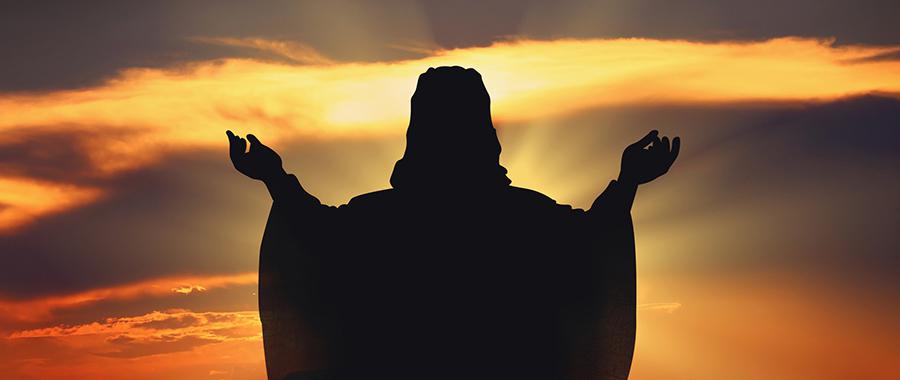
Jėzus veda žydų patirtį
Taip pat matėme, kad Jėzus kartu su savo tautiečiais žydais dalyvavo visoje jų patirtyje. Jis tai darė tiek jos aukštumose, tiek gilumose. Jėzaus karjera ne tik panaši į kai kurių gerai žinomų žydų karjerą. Jo patirtis atitinka žydų tautos patirtį . Jis įkūnija nacionalinį Izraelį .
Jėzaus prisikėlimas ir žydų hebrajų atgimimas
Pavyzdžiui, žydai patyrė nacionalinę mirtį , kai romėnai juos išvijo iš Biblijos žemės. Jie buvo tremtyje 1900 metų, per šį laikotarpį mirė jų nacionalinė kalba – hebrajų. Šimtus metų žydai kasdieniuose pokalbiuose nebekalbėjo hebrajų kalba. Žmonės negali gyventi be savo gimtosios kalbos, tačiau hebrajų kalba neseniai atgijo.
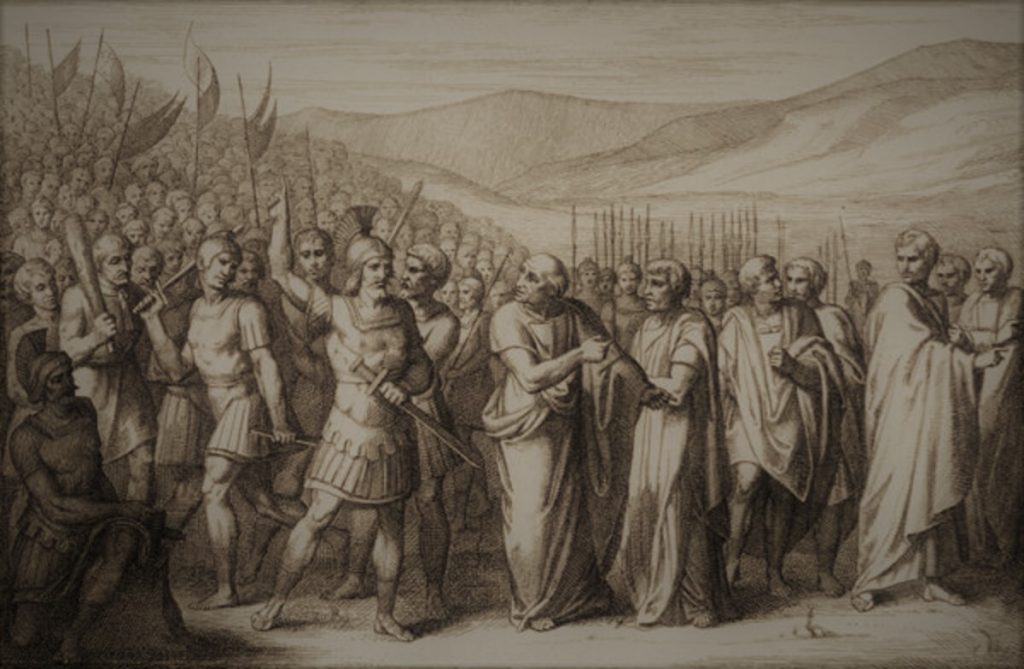

Hebrajų kalbos atgimimas prasidėjo, kai Rusijoje gimęs Eliezeras Ben-Yehuda , savarankiškai išmokęs hebrajų kalbos, 1881 m. spalio 13 d. Paryžiuje nusprendė kalbėti hebrajų kalba su kitais žydais. Tai buvo pirmas kartas per šimtus metų, kai hebrajų kalba buvo kalbama kasdieniuose pokalbiuose. Netrukus po to, persikėlęs į Jeruzalę, Ben-Yehuda bandė įtikinti kitas žydų šeimas kalbėti hebrajų kalba. Jis parengė žodynus, rašė vaikams skirtas pjeses hebrajų kalba ir leido hebrajų kalbos laikraštį.
Jo pastangos nebuvo sėkmingos, nes po dešimties metų tik keturios šeimos šnekamąja kalba kalbėjo hebrajų kalba. Iškilo kliūčių. Tėvai nenorėjo mokyti savo vaikų hebrajų kalba, kuri buvo nepraktiška, nes niekas ja nekalbėjo. Hebrajų kalbos mokyklinių vadovėlių nebuvo. Tačiau XX amžiaus pradžioje hebrajų kalba ėmė populiarėti. Šiandien ja kalba daugiau nei 9 milijonai žmonių. Kaip Vikipedijoje rašoma apie hebrajų kalbos atgimimą:
Hebrajų kalbos grįžimo prie reguliarios vartojimo procesas yra unikalus; nėra kitų natūralios kalbospavyzdžių , kai kuris nors gimtakalbis vėliau neįgytų kelių milijonų gimtakalbių.Vikipedija
Jėzus mirė ir prisikėlė iš numirusių – tai buvo nepakartojamas įvykis. Lygiai taip pat Izraelis mirė ir vėl atgijo kaip tauta per nepakartojamą hebrajų kalbos atgimimą.
Jėzus ir Toros šventės
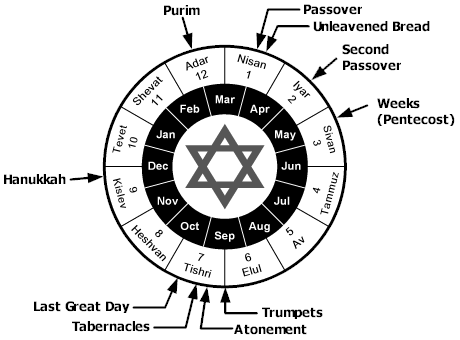
Žydai, kaip tauta, švenčia prieš 3500 metų Mozei nustatytas šventes. Kaip tauta, jie švenčia Paschą, Sabatą, Pirmuosius vaisius ir Sekmines. Šios šventės iš dalies įkūnija ir apibrėžia juos kaip žydus.
Jėzus patyrė savo:
- nukryžiavimas per Pesachą ,
- mirties poilsis per šabą ,
- prisikėlimas per Pirmuosius Vaisius ,
- ir Šventosios Dvasios atsiuntimas naujoms širdims per Sekmines .
Taigi Jėzus įkūnija, atstovauja ir patyrė visas pavasario šventes taip, kaip joks kitas žydas, įskaitant Mozę, niekada nepatyrė.
Jėzaus karjera neįkūnijo likusių Mozės nurodytų rudens švenčių. Jos vyksta rugsėjo–spalio mėnesiais: Roš Hašana, Jom Kipuras ir Sukotas. Tačiau Jėzus paskelbė, kad jis vėl sugrįš ir kad jo atėjimo laikas bus tiksliai suplanuotas. Jo pirmasis atėjimas tiksliai sutapo su visų pavasario švenčių laiku. Taigi logiška manyti, kad jo antrasis atėjimas tiksliai sutaps su šių rudens švenčių laiku.
Atgimęs ir sugrįžęs
Ir vėl čia, vien tik laukdami jo Antrojo atėjimo, matome Jėzaus karjerą, žvelgiant per istorijos laikotarpį, kaip tautinio Izraelio tipą. Per ilgą tremtį iš Biblijos žemės jie šventė kasmetinę Paschą tremtyje fraze, kuri tapo tradicija: „ Kitais metais Jeruzalėje “. Kaip tauta, jie laukė sugrįžimo į Žemę. Kaip tauta, jie sugrįžo per mūsų gyvavimo laikotarpį. Jėzus taip pat paliko Biblijos žemę ir buvo išvykęs daugiau nei 2000 metų. Tačiau, kaip ir jo tauta, jis pažadėjo savo sugrįžimą . Jis sakė, kad žydų sugrįžimas į Biblijos žemę yra ženklas, kad jo sugrįžimas „artimas“ . Taigi jis susiejo šiuos du sugrįžimus.
Pasiekite buvimą darbe
Daugelis apie Jėzų galvoja vien per krikščioniškojo pasaulio istorijos Europoje ir Amerikoje vitražą. Todėl jis dažnai laikomas tiesiog dulkėta, (šiek tiek) istorine asmenybe, gyvenusia seniai. Galbūt jis yra kultūrinis reliktas, turintis tam tikrą tradicinę vertę, bet mažai reikšmingas mūsų gyvenimui šiandien.
Tačiau Biblijoje, nuo pat pradžios iki pabaigos , pridėtoje po tūkstančių metų, jis pristatomas kaip Moters (Izraelio) palikuonis. Joje jis taip pat pristatomas kaip Kristus , kuriam lemta sugrįžti ir valdyti.
Nuo pat pradžių…
‘Aš sukelsiu priešiškumą tarp tavęs ir moters, tarp tavo sėklos ir moters sėklos. Ji sutrins tau galvą, o tu gelsi jai į kulnį.“ ‘
Pradžios knyga 3:15 (kiek mums žinoma, raštu,daugiau informacijos čia)
Iki paskutinių puslapių paskutinėje knygoje…
‘Ir didis ženklas pasirodė danguje: moteris, apsisiautusi saule, po jos kojomis mėnulis, o ant galvos dvylikos žvaigždžių vainikas. Ji buvo nėščia ir šaukė, kentėdama sąrėmius bei gimdymo skausmus. ‘
Apreiškimas Jonui 12:1-2

‘Ji pagimdė sūnų, berniuką, kuriam skirta ganyti visas tautas geležine lazda. Ir jos kūdikis buvo paimtas pas Dievą, prie Jo sosto. ‘
Apreiškimas Jonui 12:5 (parašyta I amžiuje po Kr.)
Šiandienos naujienų antraštėse matome, kad „Moteris“ atgimsta. Kadangi Sūnus yra jos, apčiuopiamai su ja susijęs, nebūtų kvaila kreiptis į Jį . Jei tai darysime, net ir neturėdami visiško supratimo, galėsime patirti Jo pažadą, kad…
‘kad žmonės ieškotų Viešpaties ir tarytum apgraibomis Jį atrastų, nes Jis netoli nuo kiekvieno iš mūsų. ‘
Apaštalų darbai 17:27
ir
‘Viešpats nedelsia ištesėti pažado, kaip kai kurie mano, tačiau kantriai elgiasi su mumis, nenorėdamas, kad kuris pražūtų, bet kad visi atsiverstų. ‘
Antrasis Petro laiškas 3:9
Tolesniam apmąstymui
- Kaip Jėzaus Kančios savaitės veiksmai dera su Kūrinijos savaitės įvykiais. Tai rodo tūkstančius metų apimančią choreografiją, kurios joks žmogaus protas negali surežisuoti.
- Prisikėlimo racionalus tyrimas. Ar yra istorinių įrodymų, patvirtinančių tai?
- Kodėl Jėzus mirė ant kryžiaus? Ką tai reiškia man ir tau?
- Kaip pastarojo meto pasaulinė patirtis su COVID-19 iliustruoja Jėzaus aukos prasmę.
- Kaip Sūnaus mirties detales išpranašavo jo protėvis, karalius Dovydas.